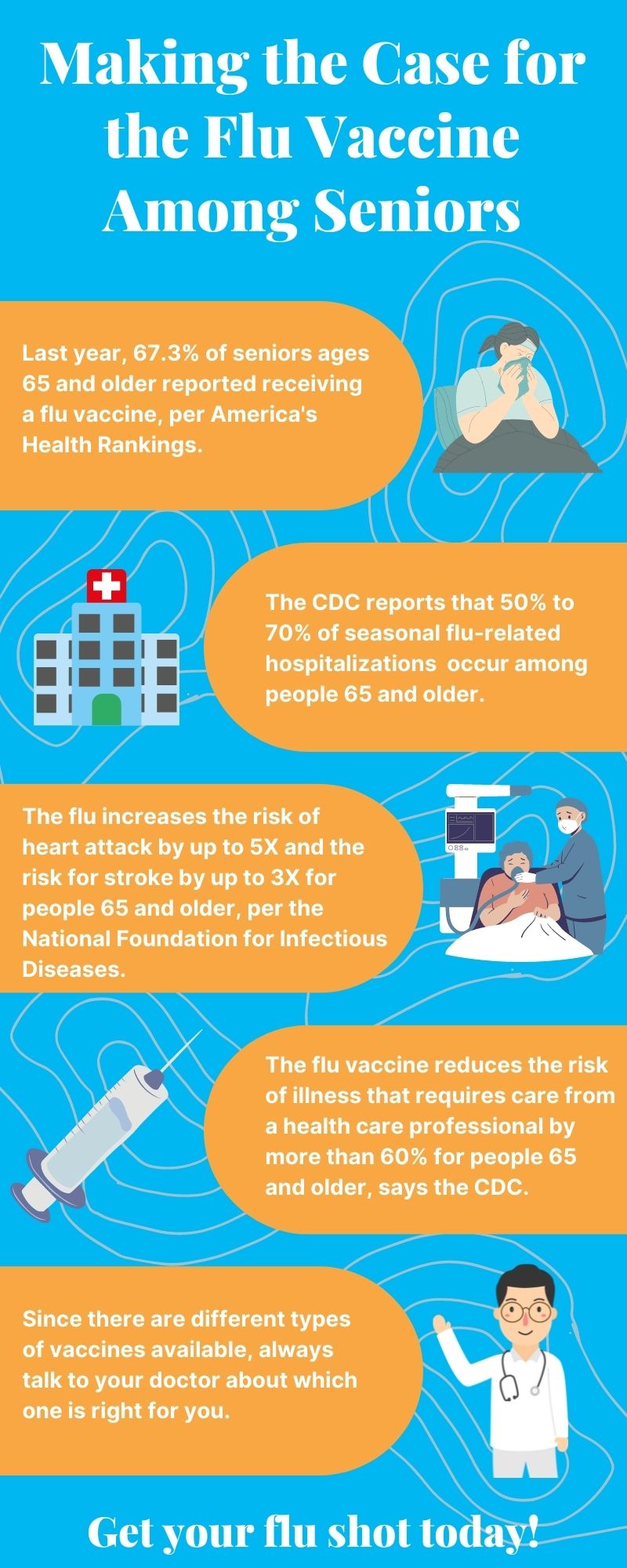Flu season is almost in full swing, and older adults, and seniors in particular, need to be extra cautious. To make a case for the flu vaccine among Medicare-eligible adults, we scoured the web for stats on some of the dangers that the flu poses for older adults, the complications it can cause, as well as the efficacy and benefits of getting the shot.

It’s almost that time of the year again – achoo.
Flu season will soon be in full swing, and while it is recommended that all people get vaccinated to help prevent getting the flu, older adults, and seniors in particular need to be extra cautious.That’s because people who are 65 years and older are at higher risk of developing serious complications from the influenza virus (a.k.a. the flu) when compared with younger adults.

To make a case for the flu vaccine among Medicare-eligible adults, we scoured the web for stats on some of the dangers that the flu poses for older adults, the complications it can cause, as well as the efficacy and benefits of getting the shot.
1. Last year, 67.3% of seniors ages 65-plus reported receiving a flu vaccine. (Source: America’s Health Rankings)
2. It’s estimated that between 70% and 85% of seasonal flu-related deaths have occurred in people 65 years and older. (Source: CDC)
3. Between 50% and 70% of seasonal flu-related hospitalizations have occurred among people 65 years and older. (Source: CDC)
4. There are other risk factors that are not as obvious. For example, the flu increases the risk of heart attack by three to five times. (Source: National Foundation for Infectious Disease)
5. The flu also increases the risk for stroke by two to three times in the first two weeks of infection for those aged 65-plus. (Source: National Foundation for Infectious Disease)
6. Taking into account the various complications that can be caused by the flu, seniors ages 65-plus are at a six-time higher risk of dying from flu and related complications than younger, heathier adults. (Source: National Foundation for Infectious Disease)
7. And the dangers of the flu only grow with age. The death rate from pneumonia and influenza is close to 130 times higher in people who are 85 years of age and older, compared to people ages 45 to 54. This increased risk due to age is even higher than that seen in heart disease, stroke, cancer, and other leading causes of death. (Source: Silverbook)
8. Flu vaccination has reduced the risk of medically attended illness (i.e. illness that results in care from a health care professional) caused by H1N1 or influenza B viruses by more than 60% among people 65 years and older. (Source: CDC)
9. Seniors in the Black community are about 20% less likely than their white counterparts to get flu shots, even though they are at higher risk of severe flu. Even those who do get the vaccine are about 30% less likely to get the high-dose version. (Source: KHN)
10. On June 30, 2022, the CDC announced continued support for a recommendation to use the higher dose flu vaccines for adults 65 years and older. Available evidence indicates that vaccinating older adults with the high-dose vaccine leads to a stronger immune response against influenza than the regular-dose vaccine. Fluzone, for example, a high-dose flu vaccine, was found to be 24% more effective in preventing flu in adults 65 years and older relative to a standard-dose vaccine. (Source: New England Journal of Medicine)
COVID-19 has gotten all the headlines lately, but it is important to remember that the flu can also be deadly, especially to older adults. The good news is that you can now get vaccinated for both at the same time.
Medicare and Medicare Advantage plans cover the cost of a flu vaccine as long as the customer visits a participating provider. Vaccines are generally available not only at doctor’s offices, but also at urgent care centers and pharmacies. Some insurers, like Cigna, will even provide customers with an incentive to get the flu vaccine. Since there are different types of vaccines available, you should always talk to your doctor about which one is right for you.
Watch the video below to learn more about flu, pneumonia, COVID-19, and the common cold. Learn key distinctions between them and ways you can help prevent yourself, and others, from getting sick.